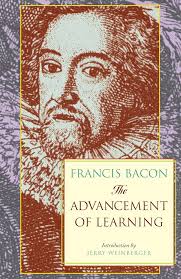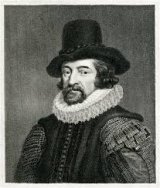The Advancement of Learning Page #22
The Advancement of Learning, published by Francis Bacon in 1605, is a foundational text in the history of science and philosophy. In this work, Bacon advocates for empirical research and the systematic organization of knowledge, laying the groundwork for the scientific method. The book critiques existing scholarly practices and proposes a new approach to learning based on observation and experimentation. It marks a significant shift towards modern scientific inquiry.
- Year:
- 1605
- 1,164 Views
Submitted by acronimous on August 11, 2024
Modified by acronimous on August 11, 2024
sovereignties and territories, yet they take themselves to have a kind of contract, fraternity, and correspondence one with the other, insomuch as they have provincials and generals. And surely as nature createth brotherhood in families, and arts mechanical contract brotherhoods in communalties, and the anointment of God superinduceth a brotherhood in kings and bishops, so in like manner there cannot but be a fraternity in learning and illumination, relating to that paternity which is attributed to God, who is called the Father of illuminations or lights. 14. The last defect which I will note is, that there hath not been, or very rarely been, any public designation of writers or inquirers concerning such parts of knowledge as may appear not to have been already sufficiently laboured or undertaken; unto which point it is an inducement to enter into a view and examination what parts of learning have been prosecuted, and what omitted. For the opinion of plenty is amongst the causes of want, and the great quantity of books maketh a show rather of superfluity than lack; which surcharge nevertheless is not to be remedied by making no more books, but by making more good books, which, as the serpent of Moses, might devour the serpents of the enchanters. 15. The removing of all the defects formerly enumerate, except the last, and of the active part also of the last (which is the designation of writers), are opera basilica; towards which the endeavours of a private man may be but as an image in a crossway, that may point at the way, but cannot go it. But the inducing part of the latter (which is the survey of learning) may be set forward by private travail. Wherefore I will now attempt to make a general and faithful perambulation of learning, with an inquiry what parts thereof lie fresh and waste, and not improved and converted by the industry of man, to the end that such a plot made and recorded to memory may both minister light to any public designation, and, also serve to excite voluntary endeavours. Wherein, nevertheless, my purpose is at this time to note only omissions and deficiences, and not to make any redargution of errors or incomplete prosecutions. For it is one thing to set forth what ground lieth unmanured, and another thing to correct ill husbandry in that which is manured. In the handling and undertaking of which work I am not ignorant what it is that I do now move and attempt, nor insensible of mine own weakness to sustain my purpose. But my hope is, that if my extreme love to learning carry me too far, I may obtain the excuse of affection; for that “It is not granted to man to love and to be wise.” But I know well I can use no other liberty of judgment than I must leave to others; and I for my part shall be indifferently glad either to perform myself, or accept from another, that duty of humanity—Nam qui erranti comiter monstrat viam, &c. I do foresee likewise that of those things which I shall enter and register as deficiences and omissions, many will conceive and censure that some of them are already done and extant; others to be but curiosities, and things of no great use; and others to be of too great difficulty, and almost impossibility to be compassed and effected. But for the two first, I refer myself to the particulars. For the last, touching impossibility, I take it those things are to be held possible which may be done by some person, though not by every one; and which may be done by many, though not by any one; and which may be done in the succession of ages, though not within the hourglass of one man’s life; and which may be done by public designation, though not by private endeavour. But, notwithstanding, if any man will take to himself rather that of Solomon, “Dicit piger, Leo est in via,” than that of Virgil, “Possunt quia posse videntur,” I shall be content that my labours be esteemed but as the better sort of wishes; for as it asketh some knowledge to demand a question not impertinent, so it requireth some sense to make a wish not absurd. I. (1) The parts of human learning have reference to the three parts of man’s understanding, which is the seat of learning: history to his memory, poesy to his imagination, and philosophy to his reason. Divine learning receiveth the same distribution; for, the spirit of man is the same, though the revelation of oracle and sense be diverse. So as theology consisteth also of history of the Church; of parables, which is divine poesy; and of holy doctrine or precept. For as for that part which seemeth supernumerary, which is prophecy, it is but divine history, which hath that prerogative over human, as the narration may be before the fact as well as after. (2) History is natural, civil, ecclesiastical, and literary; whereof the first three I allow as extant, the fourth I note as deficient. For no man hath propounded to himself the general state of learning to be described and represented from age to age, as many have done the works of Nature, and the state, civil and ecclesiastical; without which the history of the world seemeth to me to be as the statue of Polyphemus with his eye out, that part being wanting which doth most show the spirit and life of the person. And yet I am not ignorant that in divers particular sciences, as of the jurisconsults, the mathematicians, the rhetoricians, the philosophers, there are set down some small memorials of the schools, authors, and books; and so likewise some barren relations touching the invention of arts or usages. But a just story of learning, containing the antiquities and originals of knowledges and their sects, their inventions, their traditions, their diverse administrations and managings, their flourishings, their oppositions, decays, depressions, oblivions, removes, with the causes and occasions of them, and all other events concerning learning, throughout the ages of the world, I may truly affirm to be wanting; the use and end of which work I do not so much design for curiosity or satisfaction of those that are the lovers of learning, but chiefly for a more serious and grave purpose, which is this in few words, that it will make learned men wise in the use and administration of learning. For it is not Saint Augustine’s nor Saint Ambrose’s works that will make so wise a divine as ecclesiastical history thoroughly read and observed, and the same reason is of learning. (3) History of Nature is of three sorts; of Nature in course, of Nature erring or varying, and of Nature altered or wrought; that is, history of creatures, history of marvels, and history of arts. The first of these no doubt is extant, and that in good perfection; the two latter are bandied so weakly and unprofitably as I am moved to note them as deficient. For I find no sufficient or competent collection of the works of Nature which have a digression and deflexion from the ordinary course
Translation
Translate and read this book in other languages:
Select another language:
- - Select -
- 简体中文 (Chinese - Simplified)
- 繁體中文 (Chinese - Traditional)
- Español (Spanish)
- Esperanto (Esperanto)
- 日本語 (Japanese)
- Português (Portuguese)
- Deutsch (German)
- العربية (Arabic)
- Français (French)
- Русский (Russian)
- ಕನ್ನಡ (Kannada)
- 한국어 (Korean)
- עברית (Hebrew)
- Gaeilge (Irish)
- Українська (Ukrainian)
- اردو (Urdu)
- Magyar (Hungarian)
- मानक हिन्दी (Hindi)
- Indonesia (Indonesian)
- Italiano (Italian)
- தமிழ் (Tamil)
- Türkçe (Turkish)
- తెలుగు (Telugu)
- ภาษาไทย (Thai)
- Tiếng Việt (Vietnamese)
- Čeština (Czech)
- Polski (Polish)
- Bahasa Indonesia (Indonesian)
- Românește (Romanian)
- Nederlands (Dutch)
- Ελληνικά (Greek)
- Latinum (Latin)
- Svenska (Swedish)
- Dansk (Danish)
- Suomi (Finnish)
- فارسی (Persian)
- ייִדיש (Yiddish)
- հայերեն (Armenian)
- Norsk (Norwegian)
- English (English)
Citation
Use the citation below to add this book to your bibliography:
Style:MLAChicagoAPA
"The Advancement of Learning Books." Literature.com. STANDS4 LLC, 2025. Web. 8 Mar. 2025. <https://www.literature.com/book/the_advancement_of_learning_3165>.








Discuss this The Advancement of Learning book with the community:
Report Comment
We're doing our best to make sure our content is useful, accurate and safe.
If by any chance you spot an inappropriate comment while navigating through our website please use this form to let us know, and we'll take care of it shortly.
Attachment
You need to be logged in to favorite.
Log In